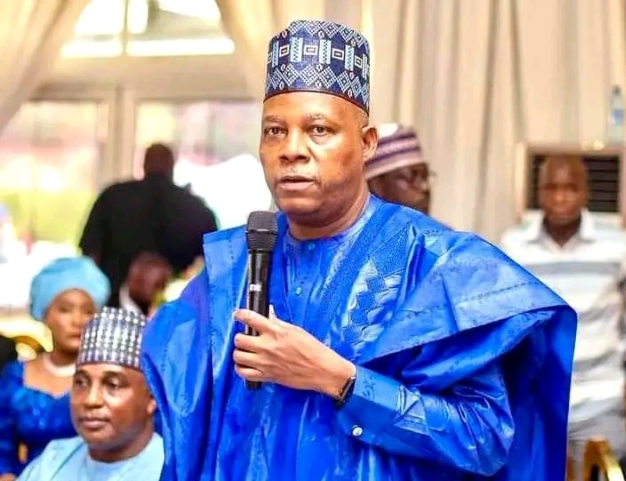
Shettima Declares Posterity Will Celebrate Tinubu for Taking Hard but Necessary Decisions

Nigeria’s Vice President, Kashim Shettima, has once again thrown his weight behind President Bola Ahmed Tinubu, describing him as a leader whose courage to take hard but necessary decisions will earn him the praise of future generations. Speaking passionately during engagements at the State House in Abuja on Thursday, Shettima portrayed Tinubu not only as a reformer but as a man with the political will to reshape the destiny of Africa’s largest economy, regardless of how unpopular some of his choices may appear today.
Shettima, who received a delegation from the Nigerian Economic Society (NES) led by its President, Professor Adeola Adenikinju, said Tinubu’s administration is deliberately working to diversify the economy through strategic partnerships and reforms. He cited the President’s recent trip to Brazil which produced five signed Memoranda of Understanding across critical sectors including aviation, foreign affairs, science and technology, and agriculture. According to him, these steps were not random, but intentional moves by a government committed to breaking Nigeria’s over-dependence on oil revenues.
“In President Bola Tinubu, you have an ally, a friend who grew up in the same ecosystem as you, who speaks your language of business and commerce, who understands the economic terrain, and most importantly, who has the political courage,” Shettima said. He noted that Nigeria is blessed with a youthful population and sits in a position to fill global talent gaps if its potential is effectively harnessed. He stressed that the Tinubu administration is determined to turn what has often been described as the country’s “demographic burden” into a true demographic dividend.
The Vice President pointed out that while Nigeria grapples with challenges, the country is equally rich with opportunities. He cited examples of top African unicorn companies domiciled in Nigeria as proof of the intellectual capacity, versatility, and resilience of its people. Shettima assured the NES that the President’s Renewed Hope Agenda is more than rhetoric, saying the administration remains open to expert advice and robust economic solutions.
Professor Adenikinju, speaking on behalf of the Nigerian Economic Society, praised Tinubu’s policies as bold, profound, and already producing results. He pledged the society’s support for the administration, even offering to contribute directly to the Federal Government’s economic management team and other policy-making organs. He urged the reactivation of the Economic Intelligence Unit in the presidency, stressing that evidence-based advisory will help consolidate the gains of reforms. The NES President also announced that Shettima would be conferred with the society’s highest honor, the Fellow of the Nigerian Economic Society (FNES), at its upcoming national conference on September 9 in Abuja.
But Shettima’s engagements did not end with economists. He also received a delegation from the Nigerian Institute of Architects (NIA), led by its President, Mobolaji Adealo Adeniyi. The Vice President used the platform to reaffirm the government’s support for architecture as a driver of national development. The NIA had appealed for the constitution of a presidential task team to conceptualize and operationalize good architecture in Nigeria, and Shettima assured them that their requests were fully granted.
He further described architecture as not just a profession but a national tool for social, economic, and cultural transformation. “We have more than 10,000 architects in this country; we have people with the experience, with the exposure and technical knowledge to add value,” Shettima said. He emphasized that President Tinubu remains a compassionate leader who does not seek to hurt anyone, but whose sense of responsibility demands tough calls for the good of the nation. “Leadership requires taking hard decisions, and I believe that in the fullness of time, posterity will be kind to him,” the Vice President declared.
The architects, in turn, recognized Shettima as Nigeria’s Champion of Good Architecture, arguing that elevating design as a national priority would unlock enormous economic opportunities. NIA President Adeniyi underscored the relevance of architecture in achieving not only the government’s Renewed Hope mandate but also the United Nations Sustainable Development Goals. She listed the numerous societal benefits of good architecture, ranging from improved schools, hospitals, airports, rail stations, and factories, to sustainable homes, green spaces, and tourist facilities.
Adeniyi also did not shy away from addressing challenges bedeviling the sector, including poor adherence to design standards, reliance on imported building materials, lack of advanced expertise, and the prevalence of substandard construction inputs. She called on Shettima to serve as the bridge between government aspirations and practical implementation, inviting him to the NIA’s 65th Annual General Meeting scheduled for November 26, 2025, where he is expected to be conferred with an Honorary Fellowship of the Institute.
Shettima’s twin meetings with economists and architects captured the multi-sectoral approach the Tinubu administration says it is pursuing. From economic diversification through deliberate partnerships to architectural reforms aimed at improving national infrastructure, the Vice President presented the government as open to collaboration, grounded in expertise, and driven by a strong sense of responsibility to future generations.
He reiterated his belief that the success of Nigeria carries global significance. “Together, we can make this country a great nation. What binds us together supersedes whatever divides us. If this country succeeds, the black man can hold his head high in the gathering of the black,” he told the NIA delegation, emphasizing national unity as a cornerstone of progress.
Observers note that Shettima’s remarks reflect the administration’s strategy of defending its reformist agenda despite mounting public discontent over rising costs of living, subsidy removal, and tax adjustments. His framing of Tinubu’s leadership as one that will be vindicated by posterity echoes a recurring theme from government officials who argue that short-term sacrifices are unavoidable for long-term stability.
Whether posterity will indeed judge Tinubu kindly remains to be seen, but Shettima’s assertion underlines a calculated political narrative: that this government’s actions, however painful in the present, are rooted in necessity rather than expedience. With continued outreach to professional bodies, the administration appears intent on building both technical and moral legitimacy for its reform path.
For now, Vice President Shettima has staked his political reputation on defending the President’s courage. In his words, Tinubu is not only a leader with vision but one with the heart of compassion, and while Nigerians may grumble today, history books will remember him as the man who took the tough road for the nation’s survival and eventual greatness.


